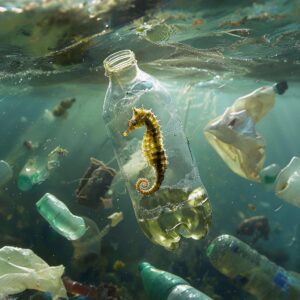
New developments with biodegradable plastics
With the ongoing concerns of plastic waste and pollution it is heartening to hear that Japanese researchers have recently developed innovative biodegradable plastics that decompose rapidly in marine environments.
A team, led by Takuzo Aida at the RIKEN Center for Emergent Matter Science (CEMS), in collaboration with the University of Tokyo and Eindhoven University of Technology, has created a durable plastic that fully dissolves in seawater. This material is composed of supramolecular polymers held together by reversible interactions, formed by mixing two ionic monomers: sodium hexametaphosphate, a common food additive, and guanidinium ion-based monomers. These components can be metabolised by bacteria, ensuring complete biodegradability. The plastic maintains strength during use but rapidly breaks down in saline environments, dissolving within hours in seawater and decomposing entirely in soil within ten days, releasing nutrients beneficial to plant life.
Another significant advancement comes from researchers at Kobe University, who have developed a new bioplastic made from polylactic acid (PLA), a polyester derived from starches like sugarcane and corn. This bioplastic is not only durable but also degrades rapidly in seawater and can be mass-produced, offering a promising alternative to traditional petroleum-based plastics.
Additionally, a study led by Professor Tadahisa Iwata of the University of Tokyo demonstrated that biodegradable plastics can be degraded by microorganisms even in deep ocean environments. This finding suggests that certain biodegradable plastics have the potential to decompose in various marine settings, providing a potential solution to marine plastic pollution.
These developments are revolutionary and highlight Japan’s commitment to addressing environmental challenges through innovative materials that offer practical solutions to plastic waste in marine ecosystems.
